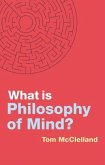William G. Lycan / Jesse J. PrinzAn Anthology
Mind and Cognition
An Anthology
Herausgeber: Prinz, Jesse J.; Lycan, William G.
William G. Lycan / Jesse J. PrinzAn Anthology
Mind and Cognition
An Anthology
Herausgeber: Prinz, Jesse J.; Lycan, William G.
- Broschiertes Buch
- Merkliste
- Auf die Merkliste
- Bewerten Bewerten
- Teilen
- Produkt teilen
- Produkterinnerung
- Produkterinnerung
First published in 1990, Mind and Cognition: An Anthology is now firmly established as a popular teaching apparatus for upper level undergraduate and graduate courses in the philosophy of mind.
Andere Kunden interessierten sich auch für
![Philosophy of Education Philosophy of Education]() Randall CurrenPhilosophy of Education49,99 €
Randall CurrenPhilosophy of Education49,99 €![The Senses and the History of Philosophy The Senses and the History of Philosophy]() The Senses and the History of Philosophy50,99 €
The Senses and the History of Philosophy50,99 €![The Philosophy of Literature The Philosophy of Literature]() Eileen JohnThe Philosophy of Literature51,99 €
Eileen JohnThe Philosophy of Literature51,99 €![What is Philosophy of Mind? What is Philosophy of Mind?]() Tom McClellandWhat is Philosophy of Mind?25,99 €
Tom McClellandWhat is Philosophy of Mind?25,99 €![Aesthetics Aesthetics]() Aesthetics55,99 €
Aesthetics55,99 €![The Routledge Handbook of Embodied Cognition The Routledge Handbook of Embodied Cognition]() The Routledge Handbook of Embodied Cognition70,99 €
The Routledge Handbook of Embodied Cognition70,99 €![Foundations of Ethics Foundations of Ethics]() Russ Shafer-LandauFoundations of Ethics49,99 €
Russ Shafer-LandauFoundations of Ethics49,99 €-
-
-
First published in 1990, Mind and Cognition: An Anthology is now firmly established as a popular teaching apparatus for upper level undergraduate and graduate courses in the philosophy of mind.
Hinweis: Dieser Artikel kann nur an eine deutsche Lieferadresse ausgeliefert werden.
Hinweis: Dieser Artikel kann nur an eine deutsche Lieferadresse ausgeliefert werden.
Produktdetails
- Produktdetails
- Blackwell Philosophy Anthologies
- Verlag: John Wiley and Sons Ltd
- 3 ed
- Seitenzahl: 896
- Erscheinungstermin: 10. Januar 2008
- Englisch
- Abmessung: 244mm x 170mm x 48mm
- Gewicht: 1548g
- ISBN-13: 9781405157858
- ISBN-10: 1405157852
- Artikelnr.: 23504559
- Herstellerkennzeichnung
- Libri GmbH
- Europaallee 1
- 36244 Bad Hersfeld
- gpsr@libri.de
- Blackwell Philosophy Anthologies
- Verlag: John Wiley and Sons Ltd
- 3 ed
- Seitenzahl: 896
- Erscheinungstermin: 10. Januar 2008
- Englisch
- Abmessung: 244mm x 170mm x 48mm
- Gewicht: 1548g
- ISBN-13: 9781405157858
- ISBN-10: 1405157852
- Artikelnr.: 23504559
- Herstellerkennzeichnung
- Libri GmbH
- Europaallee 1
- 36244 Bad Hersfeld
- gpsr@libri.de
William G. Lycan is Professor of Philosophy at the University of North Carolina at Chapel Hill. He has published widely in the field of philosophy of mind and language. His publications include Consciousness (1987), Judgement and Justification (1988), and Consciousness and Experience (1996). Jesse J. Prinz is Professor of Philosophy at the University of North Carolina at Chapel Hill. He works primarily in the philosophy of mind and cognitive science. His books include Furnishing the Mind: Concepts and Their Perceptual Basis (2002), Gut Reactions: A Perceptual Theory of Emotion (2004), and The Emotional Construction of Morals (2007).
Preface to the Third Edition.
Preface to the First Edition.
Acknowledgements.
Part I: Ontology: The Identity Theory and Functionalism:.
Introduction.
Behaviorism.
1. Excerpt from About Behaviorism: B. F. Skinner.
The Identity Theory and Machine Functionalism.
2. Is Consciousness a Brain Process?: U. T. Place.
Causal and Functionalist Views.
3. The Causal Theory of Mind: D. M. Armstrong.
4. The Nature of Mental States: Hilary Putnam.
5. Troubles with Functionalism (excerpt): Ned Block.
Anomalous Monism.
6. Mental Events: Donald Davidson.
Homuncular and Teleological Functionalism.
7. The Continuity of Levels of Nature: William G. Lycan.
Part II: Intentionality:.
Introduction.
Psychosemantics.
8. Information and Representation: Jerry A. Fodor.
9. Biosemantics: Ruth Garrett Millikan.
10. A Guide to Naturalizing Semantics (excerpt): Barry Loewer.
Other Approaches to Intentionality.
11. Modality, Normativity, and Intentionality: Robert Brandom.
Part III: The Computational Theory of Mind and Artificial Intelligence.
Introduction.
The Language of Thought and Computationalism.
12. Why There Has to Be and How There Could Be a Private Language: Jerry A.
Fodor.
13. Which Language Do We Think With?: Peter Carruthers.
Artificial Intelligence.
14. Semantic Engines: An Introduction to Mind Design: John Haugeland.
15. Can Computers Think?: John R. Searle.
Part IV: Eliminativism, Neurophilosophy, and Anti-Representationalism.
Introduction.
Eliminativism.
16. Eliminative Materialism and the Propositional Attitudes: Paul M.
Churchland.
Connectionism.
17. Neural Representation and Neural Computation: Patricia Smith Churchland
and Terrence Sejnowski.
18. Connectionism and Cognitive Architecture (excerpt): Jerry A. Fodor and
Zenon W. Pylyshyn.
Dynamical Systems Theory and Robotics.
19. What Might Cognition Be, If Not Computation?: Tim Van Gelder.
20. Intelligence Without Representation: Rodney A. Brooks.
Part V: Instrumentalism and Folk Psychology.
Introduction.
Instrumentalism.
21. True Believers: The Intentional Strategy and Why it Works: Daniel C.
Dennett.
22. Dennett on Intentional Systems: Stephen P. Stich.
23. Real Patterns: Daniel C. Dennett.
Simulationism and the Theory Theory.
24. Folk Psychology as Simulation: Robert M. Gordon.
25. Folk Psychology: Simulation or Tacit Theory? (excerpt): Stephen P.
Stich and Shaun Nichols.
Part VI: Mental Causation, Externalism, and Self-Knowledge.
Introduction.
For and Against Folk Psychology.
26. Autonomous Psychology and the Belief--Desire Thesis: Stephen P. Stich.
27. Folk Psychology is Here to Stay: Terence Horgan and James Woodward.
Supervenient Causation.
28. Mental Causation: Jaegwon Kim.
29. Type Epiphenomenalism, Type Dualism, and the Causal Priority of the
Physical: Brian P. McLaughlin.
For and Against Externalism.
30. Individualism and Supervenience: Jerry A. Fodor.
31. The Argument from Causal Powers: Robert A. Wilson.
32. Reference, Causal Powers, Externalist Intuitions, and Unicorns: Gabriel
M. A. Segal.
Self-Knowledge.
33. Knowing One's Own Mind: Donald Davidson.
34. Externalism and Inference: Paul A. Boghossian.
Radical Externalism.
35. The Extended Mind: Andy Clark and David J. Chalmers.
Part VII: Consciousness, Qualia, and Subjectivity.
Introduction.
What Is Consciousness?.
36. How Not to Find the Neural Correlate of Consciousness: Ned Block.
37. What Should We Expect from a Theory of Consciousness?: Patricia S.
Churchland.
38. Consciousness and its Place in Nature (excerpt): David J. Chalmers.
Conscious Awareness.
39. A Theory of Consciousness (excerpt): David M. Rosenthal.
40. The Superiority of HOP to HOT: William G. Lycan.
41. Perception without Awareness: Fred Dretske.
What It's Like.
42. Epiphenomenal Qualia: Frank Jackson.
43. Understanding the Phenomenal Mind: Are We All Just Armadillos?: Robert
Van Gulick.
Qualia.
44. The Intrinsic Quality of Experience: Gilbert Harman.
45. Sensation and the Content of Experience: Christopher Peacocke.
46. Blurry Images, Double Vision, and Other Oddities: Michael Tye.
Part VIII: Perceptual Content.
Introduction.
47. Simple Seeing: Fred Dretske.
48. Excerpts from The Varieties of Reference: Gareth Evans.
49. Non-conceptual Content: John McDowell.
50. Experience Without the Head: Alva Noë.
Part IX: Animal Minds.
Introduction.
51. Rational Animals: Donald Davidson.
52. The Problem of Simple Minds: Is There Anything it is Like to be a Honey
Bee?: Michael Tye.
53. Why the Question of Animal Consciousness Might Not Matter Very Much:
Peter Carruthers.
Part X: Emotion.
Introduction.
54. Emotions and Choice: Robert C. Solomon.
55. Embodied Emotions: Jesse Prinz.
56. Is Emotion a Natural Kind?: Paul E. Griffiths.
Index
Preface to the First Edition.
Acknowledgements.
Part I: Ontology: The Identity Theory and Functionalism:.
Introduction.
Behaviorism.
1. Excerpt from About Behaviorism: B. F. Skinner.
The Identity Theory and Machine Functionalism.
2. Is Consciousness a Brain Process?: U. T. Place.
Causal and Functionalist Views.
3. The Causal Theory of Mind: D. M. Armstrong.
4. The Nature of Mental States: Hilary Putnam.
5. Troubles with Functionalism (excerpt): Ned Block.
Anomalous Monism.
6. Mental Events: Donald Davidson.
Homuncular and Teleological Functionalism.
7. The Continuity of Levels of Nature: William G. Lycan.
Part II: Intentionality:.
Introduction.
Psychosemantics.
8. Information and Representation: Jerry A. Fodor.
9. Biosemantics: Ruth Garrett Millikan.
10. A Guide to Naturalizing Semantics (excerpt): Barry Loewer.
Other Approaches to Intentionality.
11. Modality, Normativity, and Intentionality: Robert Brandom.
Part III: The Computational Theory of Mind and Artificial Intelligence.
Introduction.
The Language of Thought and Computationalism.
12. Why There Has to Be and How There Could Be a Private Language: Jerry A.
Fodor.
13. Which Language Do We Think With?: Peter Carruthers.
Artificial Intelligence.
14. Semantic Engines: An Introduction to Mind Design: John Haugeland.
15. Can Computers Think?: John R. Searle.
Part IV: Eliminativism, Neurophilosophy, and Anti-Representationalism.
Introduction.
Eliminativism.
16. Eliminative Materialism and the Propositional Attitudes: Paul M.
Churchland.
Connectionism.
17. Neural Representation and Neural Computation: Patricia Smith Churchland
and Terrence Sejnowski.
18. Connectionism and Cognitive Architecture (excerpt): Jerry A. Fodor and
Zenon W. Pylyshyn.
Dynamical Systems Theory and Robotics.
19. What Might Cognition Be, If Not Computation?: Tim Van Gelder.
20. Intelligence Without Representation: Rodney A. Brooks.
Part V: Instrumentalism and Folk Psychology.
Introduction.
Instrumentalism.
21. True Believers: The Intentional Strategy and Why it Works: Daniel C.
Dennett.
22. Dennett on Intentional Systems: Stephen P. Stich.
23. Real Patterns: Daniel C. Dennett.
Simulationism and the Theory Theory.
24. Folk Psychology as Simulation: Robert M. Gordon.
25. Folk Psychology: Simulation or Tacit Theory? (excerpt): Stephen P.
Stich and Shaun Nichols.
Part VI: Mental Causation, Externalism, and Self-Knowledge.
Introduction.
For and Against Folk Psychology.
26. Autonomous Psychology and the Belief--Desire Thesis: Stephen P. Stich.
27. Folk Psychology is Here to Stay: Terence Horgan and James Woodward.
Supervenient Causation.
28. Mental Causation: Jaegwon Kim.
29. Type Epiphenomenalism, Type Dualism, and the Causal Priority of the
Physical: Brian P. McLaughlin.
For and Against Externalism.
30. Individualism and Supervenience: Jerry A. Fodor.
31. The Argument from Causal Powers: Robert A. Wilson.
32. Reference, Causal Powers, Externalist Intuitions, and Unicorns: Gabriel
M. A. Segal.
Self-Knowledge.
33. Knowing One's Own Mind: Donald Davidson.
34. Externalism and Inference: Paul A. Boghossian.
Radical Externalism.
35. The Extended Mind: Andy Clark and David J. Chalmers.
Part VII: Consciousness, Qualia, and Subjectivity.
Introduction.
What Is Consciousness?.
36. How Not to Find the Neural Correlate of Consciousness: Ned Block.
37. What Should We Expect from a Theory of Consciousness?: Patricia S.
Churchland.
38. Consciousness and its Place in Nature (excerpt): David J. Chalmers.
Conscious Awareness.
39. A Theory of Consciousness (excerpt): David M. Rosenthal.
40. The Superiority of HOP to HOT: William G. Lycan.
41. Perception without Awareness: Fred Dretske.
What It's Like.
42. Epiphenomenal Qualia: Frank Jackson.
43. Understanding the Phenomenal Mind: Are We All Just Armadillos?: Robert
Van Gulick.
Qualia.
44. The Intrinsic Quality of Experience: Gilbert Harman.
45. Sensation and the Content of Experience: Christopher Peacocke.
46. Blurry Images, Double Vision, and Other Oddities: Michael Tye.
Part VIII: Perceptual Content.
Introduction.
47. Simple Seeing: Fred Dretske.
48. Excerpts from The Varieties of Reference: Gareth Evans.
49. Non-conceptual Content: John McDowell.
50. Experience Without the Head: Alva Noë.
Part IX: Animal Minds.
Introduction.
51. Rational Animals: Donald Davidson.
52. The Problem of Simple Minds: Is There Anything it is Like to be a Honey
Bee?: Michael Tye.
53. Why the Question of Animal Consciousness Might Not Matter Very Much:
Peter Carruthers.
Part X: Emotion.
Introduction.
54. Emotions and Choice: Robert C. Solomon.
55. Embodied Emotions: Jesse Prinz.
56. Is Emotion a Natural Kind?: Paul E. Griffiths.
Index
Preface to the Third Edition.
Preface to the First Edition.
Acknowledgements.
Part I: Ontology: The Identity Theory and Functionalism:.
Introduction.
Behaviorism.
1. Excerpt from About Behaviorism: B. F. Skinner.
The Identity Theory and Machine Functionalism.
2. Is Consciousness a Brain Process?: U. T. Place.
Causal and Functionalist Views.
3. The Causal Theory of Mind: D. M. Armstrong.
4. The Nature of Mental States: Hilary Putnam.
5. Troubles with Functionalism (excerpt): Ned Block.
Anomalous Monism.
6. Mental Events: Donald Davidson.
Homuncular and Teleological Functionalism.
7. The Continuity of Levels of Nature: William G. Lycan.
Part II: Intentionality:.
Introduction.
Psychosemantics.
8. Information and Representation: Jerry A. Fodor.
9. Biosemantics: Ruth Garrett Millikan.
10. A Guide to Naturalizing Semantics (excerpt): Barry Loewer.
Other Approaches to Intentionality.
11. Modality, Normativity, and Intentionality: Robert Brandom.
Part III: The Computational Theory of Mind and Artificial Intelligence.
Introduction.
The Language of Thought and Computationalism.
12. Why There Has to Be and How There Could Be a Private Language: Jerry A.
Fodor.
13. Which Language Do We Think With?: Peter Carruthers.
Artificial Intelligence.
14. Semantic Engines: An Introduction to Mind Design: John Haugeland.
15. Can Computers Think?: John R. Searle.
Part IV: Eliminativism, Neurophilosophy, and Anti-Representationalism.
Introduction.
Eliminativism.
16. Eliminative Materialism and the Propositional Attitudes: Paul M.
Churchland.
Connectionism.
17. Neural Representation and Neural Computation: Patricia Smith Churchland
and Terrence Sejnowski.
18. Connectionism and Cognitive Architecture (excerpt): Jerry A. Fodor and
Zenon W. Pylyshyn.
Dynamical Systems Theory and Robotics.
19. What Might Cognition Be, If Not Computation?: Tim Van Gelder.
20. Intelligence Without Representation: Rodney A. Brooks.
Part V: Instrumentalism and Folk Psychology.
Introduction.
Instrumentalism.
21. True Believers: The Intentional Strategy and Why it Works: Daniel C.
Dennett.
22. Dennett on Intentional Systems: Stephen P. Stich.
23. Real Patterns: Daniel C. Dennett.
Simulationism and the Theory Theory.
24. Folk Psychology as Simulation: Robert M. Gordon.
25. Folk Psychology: Simulation or Tacit Theory? (excerpt): Stephen P.
Stich and Shaun Nichols.
Part VI: Mental Causation, Externalism, and Self-Knowledge.
Introduction.
For and Against Folk Psychology.
26. Autonomous Psychology and the Belief--Desire Thesis: Stephen P. Stich.
27. Folk Psychology is Here to Stay: Terence Horgan and James Woodward.
Supervenient Causation.
28. Mental Causation: Jaegwon Kim.
29. Type Epiphenomenalism, Type Dualism, and the Causal Priority of the
Physical: Brian P. McLaughlin.
For and Against Externalism.
30. Individualism and Supervenience: Jerry A. Fodor.
31. The Argument from Causal Powers: Robert A. Wilson.
32. Reference, Causal Powers, Externalist Intuitions, and Unicorns: Gabriel
M. A. Segal.
Self-Knowledge.
33. Knowing One's Own Mind: Donald Davidson.
34. Externalism and Inference: Paul A. Boghossian.
Radical Externalism.
35. The Extended Mind: Andy Clark and David J. Chalmers.
Part VII: Consciousness, Qualia, and Subjectivity.
Introduction.
What Is Consciousness?.
36. How Not to Find the Neural Correlate of Consciousness: Ned Block.
37. What Should We Expect from a Theory of Consciousness?: Patricia S.
Churchland.
38. Consciousness and its Place in Nature (excerpt): David J. Chalmers.
Conscious Awareness.
39. A Theory of Consciousness (excerpt): David M. Rosenthal.
40. The Superiority of HOP to HOT: William G. Lycan.
41. Perception without Awareness: Fred Dretske.
What It's Like.
42. Epiphenomenal Qualia: Frank Jackson.
43. Understanding the Phenomenal Mind: Are We All Just Armadillos?: Robert
Van Gulick.
Qualia.
44. The Intrinsic Quality of Experience: Gilbert Harman.
45. Sensation and the Content of Experience: Christopher Peacocke.
46. Blurry Images, Double Vision, and Other Oddities: Michael Tye.
Part VIII: Perceptual Content.
Introduction.
47. Simple Seeing: Fred Dretske.
48. Excerpts from The Varieties of Reference: Gareth Evans.
49. Non-conceptual Content: John McDowell.
50. Experience Without the Head: Alva Noë.
Part IX: Animal Minds.
Introduction.
51. Rational Animals: Donald Davidson.
52. The Problem of Simple Minds: Is There Anything it is Like to be a Honey
Bee?: Michael Tye.
53. Why the Question of Animal Consciousness Might Not Matter Very Much:
Peter Carruthers.
Part X: Emotion.
Introduction.
54. Emotions and Choice: Robert C. Solomon.
55. Embodied Emotions: Jesse Prinz.
56. Is Emotion a Natural Kind?: Paul E. Griffiths.
Index
Preface to the First Edition.
Acknowledgements.
Part I: Ontology: The Identity Theory and Functionalism:.
Introduction.
Behaviorism.
1. Excerpt from About Behaviorism: B. F. Skinner.
The Identity Theory and Machine Functionalism.
2. Is Consciousness a Brain Process?: U. T. Place.
Causal and Functionalist Views.
3. The Causal Theory of Mind: D. M. Armstrong.
4. The Nature of Mental States: Hilary Putnam.
5. Troubles with Functionalism (excerpt): Ned Block.
Anomalous Monism.
6. Mental Events: Donald Davidson.
Homuncular and Teleological Functionalism.
7. The Continuity of Levels of Nature: William G. Lycan.
Part II: Intentionality:.
Introduction.
Psychosemantics.
8. Information and Representation: Jerry A. Fodor.
9. Biosemantics: Ruth Garrett Millikan.
10. A Guide to Naturalizing Semantics (excerpt): Barry Loewer.
Other Approaches to Intentionality.
11. Modality, Normativity, and Intentionality: Robert Brandom.
Part III: The Computational Theory of Mind and Artificial Intelligence.
Introduction.
The Language of Thought and Computationalism.
12. Why There Has to Be and How There Could Be a Private Language: Jerry A.
Fodor.
13. Which Language Do We Think With?: Peter Carruthers.
Artificial Intelligence.
14. Semantic Engines: An Introduction to Mind Design: John Haugeland.
15. Can Computers Think?: John R. Searle.
Part IV: Eliminativism, Neurophilosophy, and Anti-Representationalism.
Introduction.
Eliminativism.
16. Eliminative Materialism and the Propositional Attitudes: Paul M.
Churchland.
Connectionism.
17. Neural Representation and Neural Computation: Patricia Smith Churchland
and Terrence Sejnowski.
18. Connectionism and Cognitive Architecture (excerpt): Jerry A. Fodor and
Zenon W. Pylyshyn.
Dynamical Systems Theory and Robotics.
19. What Might Cognition Be, If Not Computation?: Tim Van Gelder.
20. Intelligence Without Representation: Rodney A. Brooks.
Part V: Instrumentalism and Folk Psychology.
Introduction.
Instrumentalism.
21. True Believers: The Intentional Strategy and Why it Works: Daniel C.
Dennett.
22. Dennett on Intentional Systems: Stephen P. Stich.
23. Real Patterns: Daniel C. Dennett.
Simulationism and the Theory Theory.
24. Folk Psychology as Simulation: Robert M. Gordon.
25. Folk Psychology: Simulation or Tacit Theory? (excerpt): Stephen P.
Stich and Shaun Nichols.
Part VI: Mental Causation, Externalism, and Self-Knowledge.
Introduction.
For and Against Folk Psychology.
26. Autonomous Psychology and the Belief--Desire Thesis: Stephen P. Stich.
27. Folk Psychology is Here to Stay: Terence Horgan and James Woodward.
Supervenient Causation.
28. Mental Causation: Jaegwon Kim.
29. Type Epiphenomenalism, Type Dualism, and the Causal Priority of the
Physical: Brian P. McLaughlin.
For and Against Externalism.
30. Individualism and Supervenience: Jerry A. Fodor.
31. The Argument from Causal Powers: Robert A. Wilson.
32. Reference, Causal Powers, Externalist Intuitions, and Unicorns: Gabriel
M. A. Segal.
Self-Knowledge.
33. Knowing One's Own Mind: Donald Davidson.
34. Externalism and Inference: Paul A. Boghossian.
Radical Externalism.
35. The Extended Mind: Andy Clark and David J. Chalmers.
Part VII: Consciousness, Qualia, and Subjectivity.
Introduction.
What Is Consciousness?.
36. How Not to Find the Neural Correlate of Consciousness: Ned Block.
37. What Should We Expect from a Theory of Consciousness?: Patricia S.
Churchland.
38. Consciousness and its Place in Nature (excerpt): David J. Chalmers.
Conscious Awareness.
39. A Theory of Consciousness (excerpt): David M. Rosenthal.
40. The Superiority of HOP to HOT: William G. Lycan.
41. Perception without Awareness: Fred Dretske.
What It's Like.
42. Epiphenomenal Qualia: Frank Jackson.
43. Understanding the Phenomenal Mind: Are We All Just Armadillos?: Robert
Van Gulick.
Qualia.
44. The Intrinsic Quality of Experience: Gilbert Harman.
45. Sensation and the Content of Experience: Christopher Peacocke.
46. Blurry Images, Double Vision, and Other Oddities: Michael Tye.
Part VIII: Perceptual Content.
Introduction.
47. Simple Seeing: Fred Dretske.
48. Excerpts from The Varieties of Reference: Gareth Evans.
49. Non-conceptual Content: John McDowell.
50. Experience Without the Head: Alva Noë.
Part IX: Animal Minds.
Introduction.
51. Rational Animals: Donald Davidson.
52. The Problem of Simple Minds: Is There Anything it is Like to be a Honey
Bee?: Michael Tye.
53. Why the Question of Animal Consciousness Might Not Matter Very Much:
Peter Carruthers.
Part X: Emotion.
Introduction.
54. Emotions and Choice: Robert C. Solomon.
55. Embodied Emotions: Jesse Prinz.
56. Is Emotion a Natural Kind?: Paul E. Griffiths.
Index
"Since it appeared almost 20 years ago, Mind andCognition has been the premiere anthology in contemporaryphilosophy of mind. This judiciously updated edition secures itsposition for the foreseeable future."
Shaun Nichols, University of Arizona
"An enormously useful collection, including representativearticles not only on the multitude of positions before and afterthe 'cognitive revolution', but also on topics such asthe emotions, animal minds and distinctively perceptual contentthat have only recently begun to receive the attention theydeserve. An ideal text for both introductory and graduate study ofthe many topics."
Georges Rey, University of Maryland
Shaun Nichols, University of Arizona
"An enormously useful collection, including representativearticles not only on the multitude of positions before and afterthe 'cognitive revolution', but also on topics such asthe emotions, animal minds and distinctively perceptual contentthat have only recently begun to receive the attention theydeserve. An ideal text for both introductory and graduate study ofthe many topics."
Georges Rey, University of Maryland








